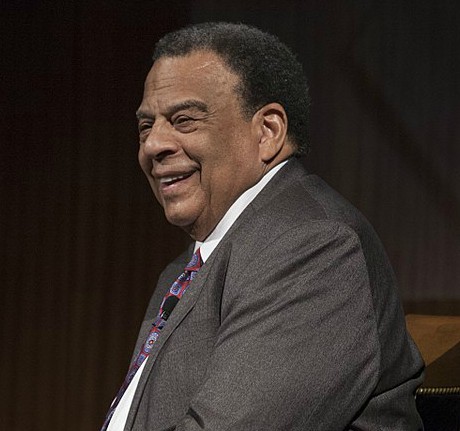Dear Pastors and Ministry Leaders,

In 2018, our theme for GCI Equipper is A year of transitions. One of those transitions involves our leadership as we seek to identify, equip and appoint new pastors and ministry leaders, while helping existing ones continue to grow. What Spirit-enabled competencies do we want our leaders to develop? We address several in this issue—I encourage you to give each your prayerful consideration.
Let’s begin by noting that effective leaders avoid offending others and being offended. Though church leaders must lead, skillful ones do so with tact and diplomacy, and they are not thin-skinned (easily offended). We learn a lot about this Christ-like leadership competency from the example of Andrew Young and the teachings of Scripture. Let me explain.
The example of Andrew Young

Andrew Young, Jr. is well known to folks who, like myself, have lived in Atlanta, GA. Young has filled multiple important leadership roles over a long and storied career: church pastor, advisor to Dr. Martin Luther King Jr., US Congressman, US Ambassador to the UN and Mayor of Atlanta. Now 85 years old, he continues to be an important leader in working for racial justice and reconciliation—a topic fraught with possibilities for offense, yet one he effectively addresses in non-offensive ways. This ability was on display recently in an NBC Meet the Press interview, where Young commented concerning the current racial strife in the United States:
We have to keep our eyes on the prize—and the prize is not vengeance, not getting even, but the prize is redemption. (~11:45 in the video).
The teachings of Scripture
As we know, redemption is the centerpiece of Jesus’ work on our behalf. It involves his whole life—from birth, through his ministry, and to the cross. It’s a work that he continues as our High Priest, sending the Holy Spirit, who transforms us into Christ’s image. We are called to reflect Jesus, including in the way we lead. I recently was doing a Bible study to help me think more deeply about the leadership competency of not being offensive and not being offended. I came upon several relevant passages:
Great peace have they which love thy law: And nothing shall offend them. (Ps. 119:165, KJV)
Jesus teaches us that loving God’s law means to whole-heartedly love God and to love others as Jesus loved us. Loving God brings great peace and security because we know God is for us. It places our minds on the higher good, and allows our expectations to rest in Jesus as opposed to putting trust in mortals, material possessions, or our general life circumstance. Loving others as Jesus loved us means always putting others first. It’s difficult to cause offense or be offended when our focus is on others rather than on the self. This too leads to peace and keeps us free from scandal or stumbling over matters that disturb our peace.
Do not cause anyone to stumble, whether Jews, Greeks or the church of God. (1 Cor. 10:32)
Paul explains that it is not acceptable to use even lawful things in ways that offend others. By referring to Jews, Greeks and the church of God, Paul is being all-inclusive. In our eating, drinking, and all we do, the primary object is always to glorify God. While it is true that we cannot prevent others from taking offense, Paul reminds us to avoid those things we know will cause offense.
My dear brothers and sisters, take note of this: Everyone should be quick to listen, slow to speak and slow to become angry. (James 1:19)
James emphasizes the importance of listening before speaking or otherwise acting. We should listen to the written word (Holy Scripture) under the guidance of the Living Word (Jesus)—it’s important to hear from God above the loud noises of strife and confusion that are so rampant in our world. Instruction from God’s word allows us to filter that noise, then empowers us to not react in visceral outbursts.
When they hurled their insults at him, he did not retaliate; when he suffered, he made no threats. Instead, he entrusted himself to him who judges justly. (1 Peter 2:23)
Conclusion
Following these teachings of Scripture leads to wisdom and the tranquility we need to be effective leaders. In keeping with the heart of God, who alone is our judge, we don’t look for revenge. Rather, as both Andrew Young and Scripture teach, we look to the “prize” of redemption. We want everyone, including those who offend us, to rest in the redemptive care, which includes the perfect judgment of their Savior. As Young mentions in the interview, his father taught him to not become emotionally imbalanced when provoked, but rather to be patient and engage his mind. Being smart versus getting angry wins every time!
As Christians, we have been given the mind and presence of Christ through the Spirit’s indwelling. Yielding to Christ’s voice, rather than to the loud divisive voice of the world around us, is an everyday struggle. Jesus’ exclamation from the cross, “Father forgive them, they don’t know what they are doing,” is the ultimate example for us to follow in a crazy world where offense seems to be the norm. Instead of taking offense or being offensive, we choose to think the best of people and to react with forgiveness. We choose to love as Jesus loves— putting others first.
Placing our trust in our all-knowing triune God, and seeking to glorify him in all we do, is the true path to keeping us secure. Remembering Andrew Young’s timely words, that redemption is the prize, will keep us focused when challenging events come our way.
Finding my peace in Christ,
Greg Williams
PS: For additional resources related to developing ministry competency, go to www.gci.org/competency.



Wow, praise God, very helpful infor,thank you so much.
Thanks for your insight. May the good Lord continue to enrich you all as you do His work.
I give you bucket loads of thanks in the words you spoke, and the authority you cited from. May we continue to preach and teach from the inspired “written word” of God. Thanks again, and keep it coming.
Thanks Greg, your article brought to mind the song rendered from the prayer of St. Francis, “Lord Make Us Instruments of Your Peace.” As I think of my own thin skin, I pray the message will really go to my heart.
Thanks Greg–work smarter, not angrier!
Thank you for the reminder & encouragement as we walk w/Jesus.
Jimmie English
Greg, thanks for this. It seems like more and more the temptation is to seek out something to find offensive or be mad about. The skill of not being easily offended is as valuable as the skill to avoid offense.
I am encouraged by the fact that after many years of being a leader, you are still doing studies on how to be an effective and a better leader. Thank you. And, a nice job on that Speaking of Life video!